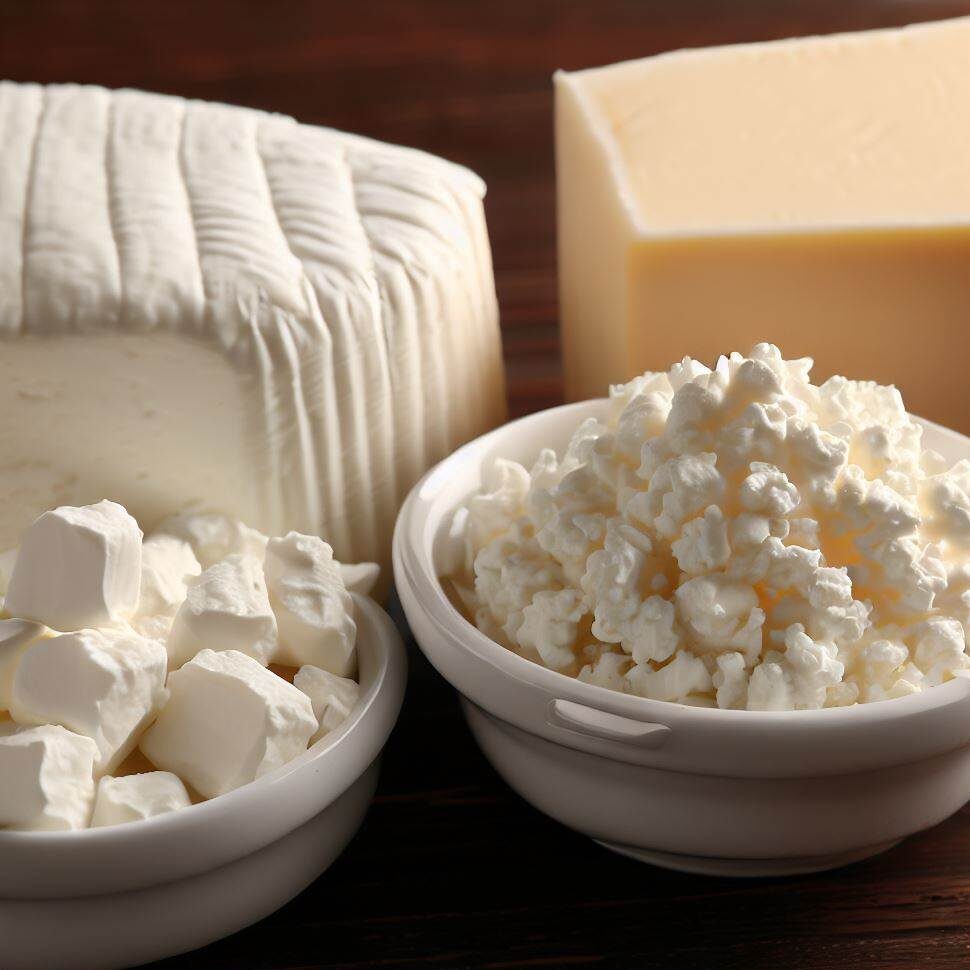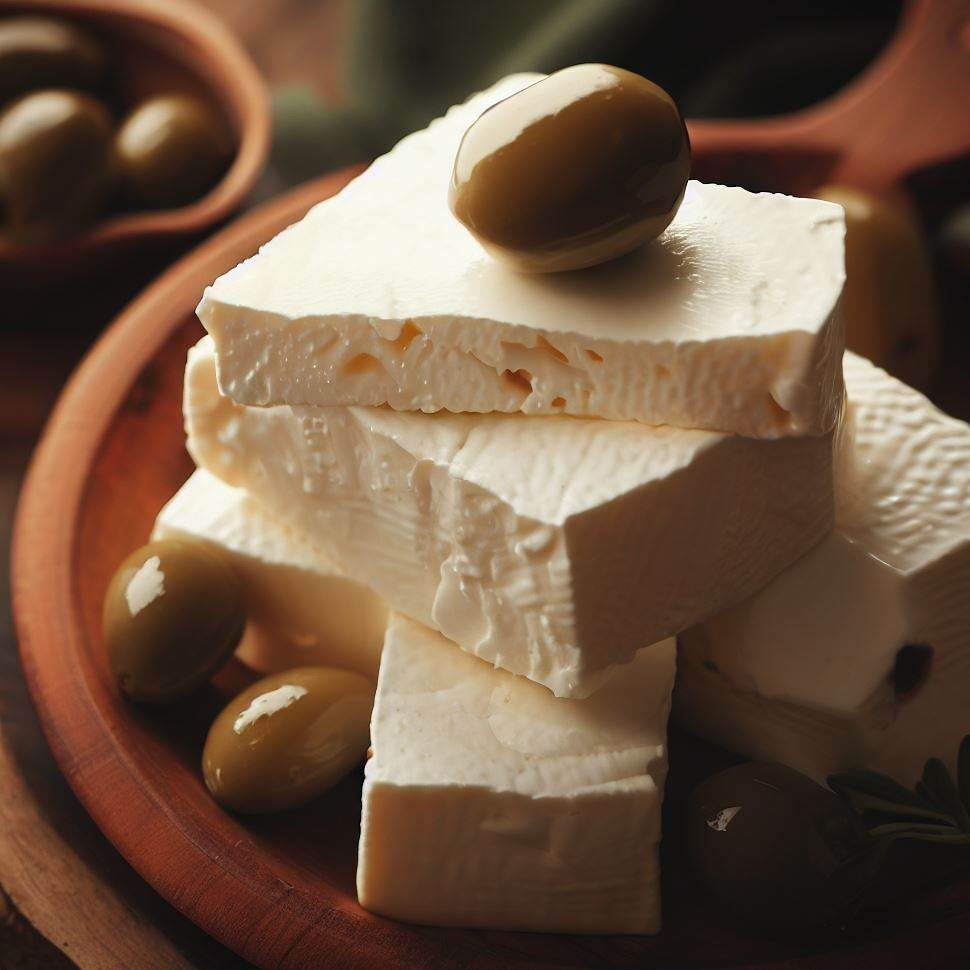Can Dogs Eat Feta Cheese? The Cheesy Truth

Cheese has become one of the most popular snack items for humans and canines. But with so many cheese types, how do you know if can dogs eat feta cheese?
This article will explore whether dogs can safely enjoy feta cheese. For pet owners looking for an answer, don’t worry – you’re not alone! With so much conflicting information on the internet today, finding reliable answers is hard.
We’ve got you covered; here, we’ll dive into the cheesy truth behind canine consumption of feta cheese. Read on to learn more and ensure your furry friends stay healthy and happy!
Is Feta Cheese Good For Dogs? Let’s Find Out

Feta cheese can be a tasty treat for both humans and dogs. But is feta cheese good for dogs? The truth is, it depends on your individual pup.
Feta cheese contains lactose, which many dogs have difficulty digesting. Additionally, the high saturated fat content in feta cheese can lead to weight gain and other health problems like pancreatitis.
So while some experts say that small amounts of feta are okay for most adult dogs, others recommend avoiding this type of cheese altogether.
If you do decide to give your pet feta cheese occasionally, always keep an eye out for signs that they may be having trouble digesting it, such as vomiting or diarrhea.
No matter your decision regarding feeding your pup feta cheese, as long as you consult with a professional and monitor them closely when trying something new, you can ensure that they remain happy and healthy!
The Pros And Cons Of Dogs Eating Cheese: What You Need To Know
When it comes to giving cheese to dogs, feta is often a controversial topic. On the one hand, feta cheese can be an excellent source of protein and calcium for your pup; on the other hand, it’s very high in fat and could potentially cause health issues such as obesity or pancreatitis if given too much.
Here are some things you should know about feeding your dog feta cheese:
- Feta cheese contains moderate amounts of lactose, which may not be safe for all dogs.
- If fed properly, feta is high in nutrients like phosphorus and calcium that can benefit canine bones and joints.
- However, due to its relatively high-fat content, only feed small portions at once – no more than 10% of their daily calorie intake should come from treats!
- Store-bought feta usually has added salt, so look out for this when buying – try to find brands without additional preservatives.
Cottage Cheese, Cream Cheese, And String Cheese: Which Cheese Can Dogs Eat?

Picture a pup eagerly waiting at the dinner table. His tail is wagging and his eyes are wide with anticipation of the tasty treats that await him.
In front of him lies an array of delicious cheeses, but which ones can be safely enjoyed? Cottage, string, and cream cheese may have their place in the canine culinary world; however, some should only be enjoyed as occasional snacks.
Cottage cheese is one of the safest options for dogs to eat because it has lower fat and sodium levels than other types of cheese, making it a great snack choice. It’s also low in lactose, so intestinal distress is less likely due to its digestion.
String cheese is another option for pups who like to nibble on something savory since it’s low in salt and lactose.
Cream cheese should not be given to your dog too often as it contains high amounts of fat, potentially leading to obesity-related health issues if consumed excessively.
No matter what type of cheese you choose for your four-legged friend, remember that moderation is always key when feeding any food to your pet!
Lactose Intolerant Dogs: Can They Still Eat Cheese?

Many dog owners worry if their pup can eat cheese, particularly if they are lactose intolerant. While most dairy products should be avoided or given in limited amounts, there are some types of cheese that dogs can enjoy as an occasional treat.
Mozzarella, cheddar, swiss and brie cheeses have a lower fat content than other varieties like blue cheese and goat cheese, making them a better option for dogs with sensitive stomachs.
It is important to note that even low-fat cheeses contain more calories than most treats, so it’s best to give them sparingly. The exact amount of cheese your pup should consume depends on their size and activity level – you may need to talk to your vet about the ideal portion for your furry friend,
When introducing any new food into your pet’s diet, start off slow by giving just a small piece at first and gradually increasing over time if no adverse reactions occur.
Cheese can be a fun way to spice up mealtime or reward good behavior, but always remember: moderation is key! As long as you stick to the recommended serving size and watch out for signs of digestive upset, your pup can still indulge while staying healthy too!
My Dog Ate Feta Cheese, What Should I Do? Tips For Handling Your Dog’s Cheese Mishap

You may feel a bit concerned if your dog has gotten into the feta cheese. Some cheeses can indeed be toxic to dogs and bad for their health, so it’s understandable why you would worry.
Here are three tips for handling this mishap:
- Keep an eye on them for any signs of gastric upset such as gas, bloating, or diarrhea.
- Avoid giving them more cheese in the future – no matter how much they beg!
- Ensure their regular diet consists of nutritious dog food rather than human snacks like cheese.
In short, if your pup gets into trouble with the feta cheese, there’s no need to panic – keep an eye out for potential problems and ensure that their diet is healthy and appropriate going forward!
Greek Feta Cheese And Dogs: Is It Ok For Dogs To Eat?

It’s natural to worry when your dog eats something not intended for them, like feta cheese. But it’s important to know that Greek feta cheese isn’t toxic to dogs, so you don’t need to panic if your pup has had a taste of the salty treat.
However, moderation is key – as with any other type of food given to dogs – since feta cheese can be high in lactose and saturated fat.
So what should you do if your furry companion gets into some tasty feta? First off, keep an eye on them and check for signs of discomfort or sickness such as vomiting or diarrhea. If they seem fine after eating the cheese, all there is left to do is ensure it doesn’t happen again!
While most cheeses are safe for canine consumption in moderation– including cheddar, cottage cheese, and Swiss – always double-check with a vet if you are unsure before offering anything new to your four-legged friend.
That way, you can rest assured knowing exactly which types of cheese are ok for Fido to eat…and which ones aren’t!
Cheese Types And Dogs: Which Cheese Is Safe For Dogs To Eat?
Cheese is a popular dairy product that can be enjoyed by humans and their canine companions alike. But with so many types of cheese out there, it’s important to know which ones are safe for dogs to eat.
Is feta cheese one of them? The cheesy truth is that while some kinds of cheese may be beneficial for dogs in moderation, feta cheese should be avoided completely due to its high lactose content.
When selecting a type of cheese to give your dog, consider what kind of health benefits or risks the food contains. Cheddar, mozzarella, and cottage cheese are all commonly recommended as ‘dog-friendly’ options due to their relatively low-fat content and high calcium levels. Swiss cheese is another good choice since it has lower amounts of lactose than other cheeses.
On the other hand, blue-veined cheeses such as Stilton, Roquefort, Cabrales, or Gorgonzola should never be given to dogs because they contain toxic mold compounds that can cause serious health issues if ingested.
Feta also falls into this category; not only does it have more lactose than most other cheeses, but its salt content makes it unsuitable for regular dog consumption.
All things considered, when feeding your pup any kind of cheese – even those deemed “safe” – do so sparingly and always monitor how they react afterwards.
Dogs And Cheese: Can Dogs Eat A Little Or Should It Be Avoided?
Feeding your dog cheese can be a tricky decision. Cheese is high in fat, sodium, and calories which can cause weight gain if fed regularly in large amounts.
It’s also important to consider that some dogs may be lactose intolerant, meaning their pancreas doesn’t produce enough of the enzyme necessary to break down the lactose found in dairy products like cheese.
If you decide to feed your dog cheese, it should always be given as an occasional treat and not as part of its regular diet; however, for small breeds or puppies who are still growing, even these treats should be avoided altogether.
Cheese contains beneficial proteins that provide healthy nutrients for our canine companions, but when considering whether or not to feed your pup cheese-like feta, it’s best to check with your vet first.
For those looking for an alternative snack for their furry friend, plenty of healthy options are available such as frozen fruits and vegetables or specially designed treats specifically made for dogs.
Although cheese might make a tasty treat from time to time, ensuring your pet stays healthy overall should remain the top priority when deciding what types of food they consume.
Concluding – Can dogs eat feta cheese?
In conclusion, cheese can be a tricky treat for dogs. It’s important to remember that some types of cheese are better than others when it comes to feeding your pup.
Cottage and cream cheeses are generally safe, while feta should be avoided due to its high salt content. As always, moderation is key – too much cheese could adversely affect your dog’s digestive system.
For owners who want to give their furry friends a special treat, try offering small amounts of low-salt string cheese or cheddar cubes as tasty alternatives.
You and your pooch can enjoy the cheesy goodness together with careful consideration and smart choices!
Source: Wikipedia –https://en.wikipedia.org/wiki/Feta






